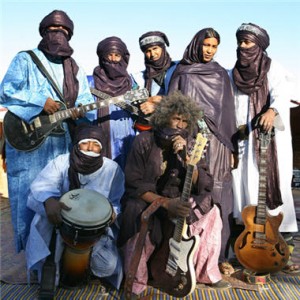Malian Youth At Camp M’bera – Exiled but Not Defeated
By Intagrist El Ansari
Nouakchott — Since the Tuareg rebellion and the capture of north Mali by Islamist groups, refugees have been overwhelming M’Bera.
This camp in south-western Mauritania is home to over 107,000 occupants. And here it is youth who are playing the most important role: not only in terms of internal organization, but in preparing fellow refugees for a return to normal life.
Since the Tuareg rebellion that took place in Mali and Niger between 1990 and 1995, young people at M’Bera have been taking a noticeably more proactive role. Or, looked at from another angle, those in camp leadership positions are getting younger and younger.
Here youth are organized into associations across the camp’s 168 zones. Each zone has its own youth group. Each group is represented within the Collectif des Jeunes du Camp de M’Bera (CJCM).
This youth collective is headed by 28-year-old Abdoul Aziz Ag Mohamed, a lawyer by profession. He attributes the change in mentality at M’Bera to its growing intellectual potential. “The new camp comprises young executives,” he explains. “And, with increasing levels of education, these young pioneers can no longer just sit back and allow certain things to happen.”
In fact, most of the camp leaders are young and well educated, often holding at least a Master’s degree. Many are qualified and have experience in the activities that the cooperative conducts.
Moving around
CJCM president Ag Mohamed is constantly moving around. He keeps busy running the camp day in and day out, but also arbitrating, if not actually resolving, quarrels. He is often called on by international organizations to attend a distribution of provisions, to sit in on a planning meeting or to coordinate census-taking work groups.
He and his colleagues can be found setting up projects to sway teenagers away from destructive thinking. “If the youth get involved, it is to help our communities. We do not intend to watch our destiny go by. That’s our challenge: empowering people to know their rights and to demand them,” says Ag Mohamed.
Mohamed Ag Malha, who serves as president of a technical committee that reinforces the camp coordination, echoes the sentiment. “The involvement of youth is essential. They form the largest population,” he says.
Staying in touch
The CJCM also comprises an information unit that allows members of the organization to be in touch with relatives who are still in north Mali. A small team gathers, processes and analyzes all kinds of information. That includes Malian political developments, news from territories occupied by the Islamists and the condition of refugees in neighboring countries.
These informants are constantly on their mobile phones. They get firsthand information from the travelers they meet.
In order to communicate with the rest of the world, the CJCM has requested that an internet connection be installed on the campsite. Until then, they find themselves travelling 20 kilometers to Bassikounou village, hoping they can connect from the offices of international organizations.
Controlling their destiny
Among the camp leaders, Mohamed El Moctar Ag Mohamedoun is one who insists on education. Having studied business management in Morocco himself, he believes education is an urgent priority. “There are hundreds of young high school and university graduates walking around here without any hope of continuing their studies. We can’t let that happen!” he says.
To convey his message, Ag Mohamedoun relies on a network of young Pan-Africanists: Afous Afous. This voluntary group of activists – its members in countries, such as Burkina Faso, Niger, Algeria – aims to regroup students and young graduates. They keep connected through telecomm.
As members of civil society, Ag Mohamed and Ag Mohamedoun and their fellow camp residents are fighting for the return of peace in Mali. This may be a last hope for these enterprising youth, but they do not expect to be pitied for living in a state of exile. As one young camp resident puts it: “We don’t want to stay refugees forever. But until then, we’re fighting for the future by taking control of our destiny.” – Radio Netherlands Worldwide
-
Posted by admin on Oct 2 2012. Filed under African News. You can follow any responses to this entry through the RSS 2.0. You can leave a response or trackback to this entry










